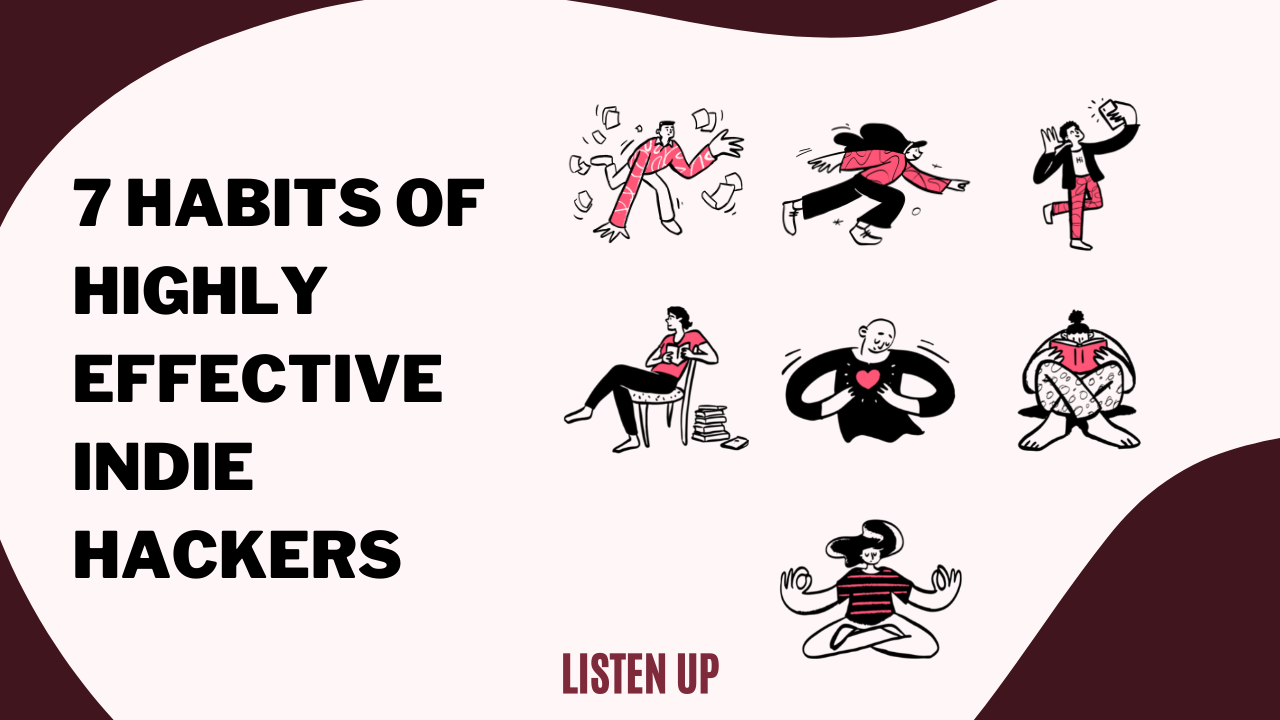7 Habits of Highly Effective Indie Hackers

There's no one-size-fits-all answer for success as an indie hacker, everyone is on their unique journey.
Yet some common patterns emerge that help founders succeed with their startups.
Over the last 11 months, I’ve deeply analyzed 30+ indie hackers and their startups. This is the documentation of traits that I’ve found common to these stories. Hope it helps you in your own journey.
These are the 7 Habits of highly effective indie hackers.
Let's go👇
#1 They have deep domain knowledge
Being good at coding is different from being good at business.
For startup success, you need to understand the domain and the end-user better than most people.
It also helps them have spiky opinions about their domain. Opinions that none of the current tools solve.
That’s why some indie hackers succeed even when they are just scratching their own itch.
Examples -
- John O' Nolan was a WordPress expert for years before launching Ghost.
- Jon YongFook had been a part of a design team that needed to generate hundreds of social media images every day. That gave him the idea to start Bannerbear
- Pieter Levels was a Digital Nomad himself much before starting Nomadlist.
#2 They ship fast
Successful Indie Hackers ship fast and put their work out often. Learn from the feedback, iterate, and improve.
Especially in the early days.
During the MVP stage, before reaching product-market fit, it makes sense to ship fast.
Examples -
- Samy Dindane built Hypefury's basic features in 3 days.
- Sahil Lavingia built Gumroad's MVP in a weekend.
- Pieter Levels makes changes on his sites almost every day. He doesn't have an elaborate release process even for sites making millions in revenue.
#3 They speak to their users
You can not build the right product without talking to your users.
That's how you recognize the right problems to solve, the right positioning, and the right pricing strategy.
Examples -
- Spencer Fry had 4000 customer conversations in a year for Podia. He does 1 live demo with new users every week. Even today.
- Founders of Tally have a private community of their best users where they talk to them every day.
- Ben Orenstein of Tuple could do $8K in sales even before having a product. Just by speaking to interested users about the features, the team was building.
#4 They charge more
As an indie hacker, you don’t have a sales team at your disposal. If you try to sell a $5/month product you will have to convince 200 people to reach $1000 MRR.
But if you sell a $50/month product, you will only have to convince 20 people to reach $1000 MRR.
Most successful indie hackers realize this and don’t shy away from charging a premium for their product.
In most cases, they start small but then raise prices as they get some validation.
Examples -
- Kyle Gawley charges $895 for his SaaS boilerplate Gravity. He started with $99, but gradually moves up. He raised his price by 800%
- Jon Yongfook’s Bannerbear starts at $49/month and goes up to $299. That has helped him cross $30K MRR with just 394 customers.
- Pieter Levels started the NomadList membership at $5 and kept raising it as more people joined. Today it’s $200 for a lifetime membership.
#5 They accrue an audience.
Accruing an audience is different from actively building an audience.
It's a result of being a domain expert and shipping fast and often for many years.
And even by building in public, sharing their journey openly helps accrue an audience over time.
Examples -
- AJ had built projects such as HTML5UP and Pixelarity before Carrd. Both of those projects didn't make as much money as Carrd, but gave him a decent Twitter audience.
- Andre Azimov did the 12 startups in 12 months challenge and funneled all the eyeballs into an email list and Twitter account. Eventually, the audience helped him with Sheet2Site
- Nathan Barry had an audience of creators through his book "Authority". Then he did a 6-month challenge of building a SaaS to $5K MRR, in public. That gave him an engaged audience. That SaaS ended up becoming ConvertKit.
#6 They use constraints as superpowers
Working solo means you don't have a ton of resources for your startup. But constraints can spark creativity and even help you position the product better.
Examples -
- AJ couldn't have built a fully-fledged site builder himself. So Carrd had to be for 1-page sites. Which also made it unique.
- Spencer Fry didn't want to deal with enterprise customers, he wanted to work with individuals, so Podia focused only on creators.
- John O' Nolan only wanted to help bloggers and journalists, so Ghost is only meant for them, it's not a generic site builder.
#7 They keep going
Finding success takes time.
Most solo founders don't succeed with their 1st project. But they learn from failures and apply the lessons in the next projects.
They don't give up and eventually find success. Staying in the game long enough also gives you a great chance of getting lucky.
Examples -
- Pieter levels has made 70+ projects, out of which 4 have found success.
- Nathan Barry made 10 products before ConvertKit. And even ConvertKit could only reach $2000 MRR in the first 2 years.
- Andre Azimov, Jon Yongfook did the 12 startups challenge and failed a bunch before finding success.
Conclusion
Hope you can apply these patterns in your own journey.
It’s not about getting the 7 habits right, it’s about learning from the success of others and maximizing your own chances of success.
You can read all stories of all these indie hackers in the archive of this newsletter here - ListenUpIH.
Thank you for reading🙏
I hope you found value in this post, would love to get some feedback about the newsletter from you.
If you have 2 minutes please answer these 3 simple questions.
Every week, I share the most actionable insights and inspiring tips from successful Indie Hackers FOR aspiring Indie Hackers
Ideas + Insights + Inspiration for building profitable internet businesses💪
Sign up to Listen Up! IH and join 1850+ spirited Indie Hackers who read this newsletter every week.
Cheers,

